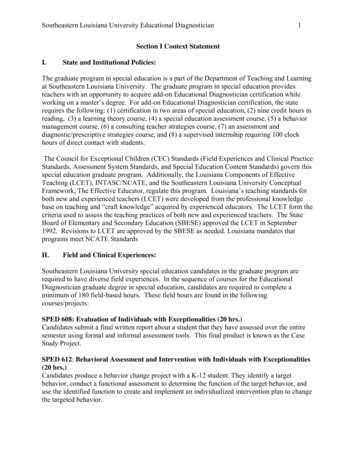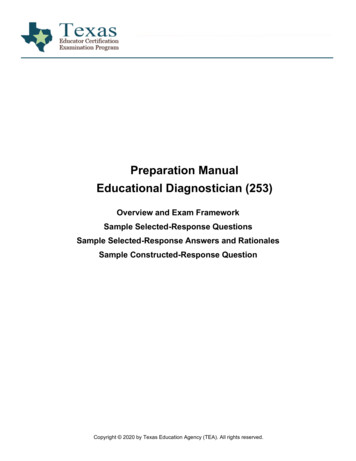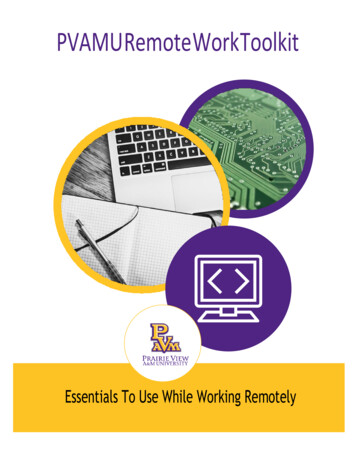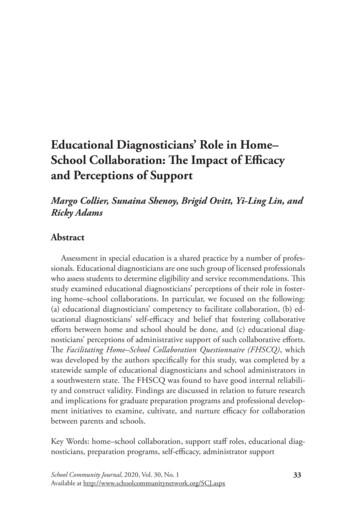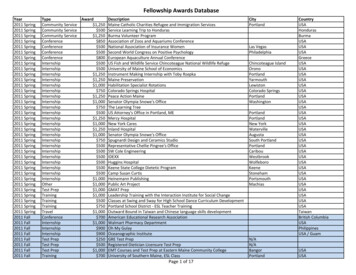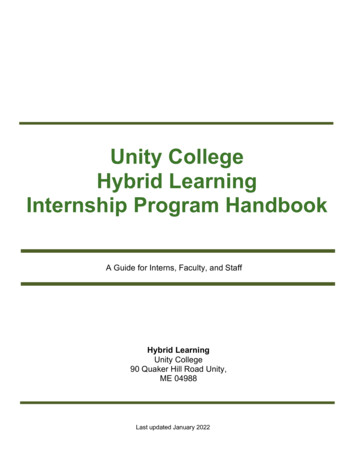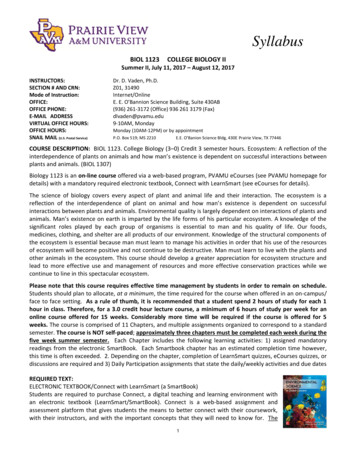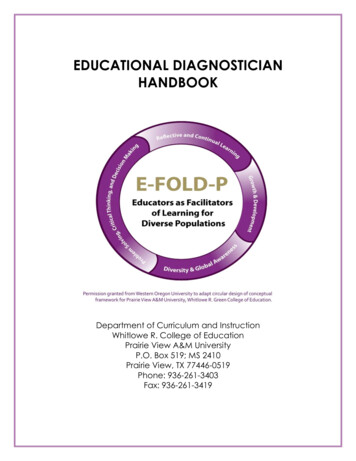
Transcription
EDUCATIONAL DIAGNOSTICIANHANDBOOKDepartment of Curriculum and InstructionWhitlowe R. College of EducationPrairie View A&M UniversityP.O. Box 519; MS 2410Prairie View, TX 77446-0519Phone: 936-261-3403Fax: 936-261-3419
TABLE OF CONTENTSPREFACE . 3APPLICATION PROCEDURES . . 4CERTIFICATION REQUIREMENTS AND FIELD EXPERIENCES . 5Internship Seminar – Purpose and DatesSite SelectionAPPROVAL OF THE SCHOOL DISTRICT . 6Student ResponsibilitiesINTERNSHIP APPLICANT REQUIREMENTS AND RESPONSIBILITIES . . 8ARTIFACTS PROVIDING EVIDENCE OF OUTCOME ACQUISITION . 10INTERNSHIP EVALUATION . . 11NCED CODE OF ETHICS. 12EDUCATIONAL DIAGNOSTICIAN DOMAINS & STANDARDS FOR STATE TEST #153 . 18STUDENT RECOGNITION AND ACCEPTANCE OF TERMS. 20ADMINISTRATIVE INTERN INFORMATION FORM . 21COOPERATING EDUCATIONAL DIAGNOSTICIAN PARTICIPATION FORM . 22BUILDING SITE ADMINISTRATIVE APPROVAL CLINICAL INTERNSHIP FORM. 23EDUCATIONAL DIAGNOSTICIAN INTERNSHIP SCORING CRITERIA. 24SCHOOL PERSONNEL EVALUATION EDUCATIONAL DIAGNOSTICIAN #153 FORM . 262
PREFACEPreparing future educational diagnosticians for school districts regionally isinherent in the mission of the Whitlowe R. Green College of Education at PrairieView A&M University. Consistent with this mission is the recognition that thechanging environment of education demands that all clinical experiencesreflect the true nature of the educational diagnostician (EDI) with a focus onexperiential activities aligned with anticipated student outcomes in P-12 districts.The Whitlowe R. Green College of Education is committed to ensuring thatcandidates experience the synchronicity of clinical experiences incorporatingtheory and practice in a multi-cultural and multi-dimensional setting. To this end,future educational diagnosticians are required to participate in the practicumprogram as a capstone experience at the conclusion of the requisitecoursework. The EDI provides future building level educational diagnosticianswith site-based experiences designed to provide additional preparation inmeeting the challenges confronting educational diagnosticians today.The EDI contains a clinical internship (required) that will be performed withinlocal school districts. The internship is offered at the end of all assignedcoursework (36 hours) in Special Education.The clinical induction component is available to candidates upon placement ata school site and provides structured mentoring and support for practicingeducational diagnosticians. Candidates are required to attend monthlyseminars focusing on professional challenges experienced by new educationaldiagnosticians. Additional support is provided during an on-site visit guided byclinicians familiar with formal evaluation, Admission, Review and Dismissal (ARD)Committee meeting in reference to building an Individual Educational Program(IEP) for student.EDI internships will include experiences in numerous settings during the course ofa semester. The Special Education Department at Prairie View A&M Universitybelieves that interns can better meet the demands of the internship when thisexperience occurs at the end of formal coursework.The intern must consult with his/her advisor and apply for placement thesemester before beginning the internship.3
APPLICATION PROCEDURESIn order to register and participate in the clinical internship course SPED 5343Practicum, an educational diagnostician candidate must:1. Complete all coursework required for certification or be in their lastsemester;2. Be admitted to candidacy in the graduate program;3. Have a GPA of 3.0 in all required courses;4. Have a valid teaching certificate;5. Have at least two year’s teaching experience;6. Have a deficiency plan on file with the Office of Teacher Certification;7. Provide proof of a passing score of 290 on the EducationalDiagnostician exam on Certify Teacher;8. Provide documentation of 6 hours of Educational Diagnostician review(Certify Teacher and/or face-to-face review);9. Have a Master’s degree or have completed the Master’s degreerequirements;10. Obtain approval from the school district(s) or other sponsoring institution(s)to complete an internship in these settings;11. Provide an endorsement of a practicing educational diagnostician whowill become the intern's supervising site supervisor.Prairie View A&M University supports the field experience concept as anextension of the learning that takes place in our special education courses. Allcandidates pursuing educational diagnostician certification are required toparticipate in the educational diagnostician internship and attendant seminars.4
Certification Requirements and Field ExperienceAs a concurrent clinical experience in the preparation of educationaldiagnosticians, the site-based clinical experience provides candidates with theopportunity to engage in learning activities related to educationaldiagnostician. The field experience must be a minimum of 200 clock hours ofeducational diagnostician experience with a certified cooperatingeducational diagnostician or LSSP (Licensed Specialist in School Psychology).Internship Seminar- Purpose and DatesInterns are required to participate in monthly seminars during the semester inwhich they are enrolled in SPED 5343. The seminar sessions are designed toextend the field experience through reflection, synthesis and analysis on theinsights of others. Contextual factors affecting student and facultyperformance are examined within specified realms of meaning andextrapolation. In addition, the seminar offers the opportunity to gain feedbackon situational cases that arise from individual clinical experiences.Site SelectionIn selecting field experience sites the university supervisor, in cooperation withthe prospective intern, places considerable importance on the availability andcooperation of a certified educational diagnostician qualified to assume therole of the cooperating educational diagnostician or LSSP. One criterion inapproving an internship is the experience of the supervising educationaldiagnostician and his/her commitment to providing a meaningful clinicalexperience.Each supervising educational diagnostician or LSSP is required to provide regularfeedback to the intern. In addition, supervising educational diagnosticians orLSSP must provide regularly scheduled evaluations of intern performance.5
APPROVAL OF THE SCHOOL DISTRICTThe intern must have written approval from the school district in addition towritten approval from the cooperating educational diagnostician or LSSP andbuilding principal. In larger districts, the intern should contact the director ofhuman resources. In smaller districts, the intern should contact the director ofspecial education and request information on the steps necessary to get districtapproval to complete a clinical internship in the district. Then the intern will needto follow the prescribed steps. A copy of the written approval document shouldbe forwarded to the Internship Program Coordinator and a separate copyplaced in the intern's portfolio.STUDENT RESPONSIBILITIESThe Intern assumes a major share of the responsibility for the success of his/herfield experience. The purpose of the internship program is to providediagnostician candidates with meaningful and relevant experiences associatedwith becoming an educational diagnostician. The intern is subject to theauthority, rules and regulations of the sponsoring school district. It is hoped thatthe participant gains valuable work-related experience that will provide acompetitive advantage when applying for a position.Specific responsibilities of the intern include:1. Keep a log of field experiences and completing all of the requirementsin a timely manner;2. Write and submit at least three Full and Individual Evaluation (FIE)reports to the Coordinator of the EDI by the end of the semester;3. Become fully acquainted with the rules and regulations of the schooldistrict;4. Attend and chair Admission, Review, Dismissal (ARD) Committeemeetings;5. Maintain a portfolio and submit the portfolio at the conclusion of theclinical experience;6. Complete all forms, experiences, and other obligations as required;7. Maintain confidentiality of all records and internal matters of the schooldistrict at all times;8. Comply with state and federal laws, district rules, policies, andregulations;9. Schedule agreed upon activities with proper administrative personnel;and10. Read and follow the Educational Diagnostician Code of Ethics.The Program Coordinator retains the right to modify or change the clinical6
experience to be more fully responsive to the goals of the program.7
INTERNSHIP APPLICANT REQUIREMENTS & RESPONSIBILITIES1) Secure approval from the local district for assignment. An agreementform with the appropriate signatures must be returned to the universitysupervisor. No internship can officially begin until this form is signed bythe appropriate school official(s) and returned to the universitysupervisor.2) Attend ALL scheduled seminars.3) Demonstrate a willingness to make adjustments for observations andconference purposes during periodic visits by the university supervisor.4) Maintain a log of his/her activities that entails a brief description of thetask involved, the date, the beginning and ending time, the amount oftime involved (expressed in fraction of an hour, ex. 2.25). The log is to beshared with the university supervisor and will be discussed during sitevisits. The Activity Log is an integral part of the development of yourelectronic portfolio. Cooperating school educational diagnosticiansmust certify the log of activities.5) The intern shall complete any additional requirements outlined by theiruniversity supervisor.The following represents a small sample of potential activities:Suggested Activities for ElementAssess special education initiatives, such as inclusion, and work withinterested faculty in developing plans for improvement.Review the availability of evaluation instruments and report writers.Recommended Activities for Element 2.1Assess the school culture by collecting data on the diversity (e.g.,population, language, disability, gender, race, socio-economic) of theschool and community. Use that data to assist with appropriate formaltesting to administer to students.Become familiar with and utilize existing data commonly available toschools.Recommended Activities for Element 2.2Conduct an audit of the IEP development process.Draft ARD meeting reports for the review of IEP.Recommended Activities for Element 2.3Review the G-Factors to assist with determining the best practices forstudent learning then lead a faculty discussion of the application toimproved student learning.8
Administer at least 3 formal achievement tests.Administer at least 3 formal intelligence tests.Write at least 3 Full and Individual Evaluation (FIE) reports.Recommended Activities for Element 2.4Develop in-service training for non-instructional staff.Develop in-service training school staff on the G-Factors –implications andrecommendations to enhance student learning.Communicate with related services personnel (counselor, physical therapy,occupational therapy, special transportation, school nurse).Recommended Activities for Element 3.2Assist in the preparation of an audit of special education legal folders.Administer at least 3 formal achievement tests.Administer at least 3 formal intelligence tests.Write at least 3 Full and Individual Evaluation (FIE) reports.Review PIEMS activity fund accounting procedures.Review the coding of students enrolled in special education- (EX: 45 PPCD,40 Inclusion)Review technologies, including assistive technologies, available to supportthe needs of students enrolled in the special education program.Recommended Activities for Element 4.1Survey to determine parental involvement in the special educationprocess including attending and participating in ARD meetings. Thenpropose recommendations based on the data in a special educationstaff meeting including the presence of a building administrator.Prepare ARD notices for parents, school staff and related services personnel.Recommended Activities for Element 5.1Activities related to elements that demonstrate the candidate's respect forthe rights of others with regard to confidentiality and dignity and engage inhonest interactions. (An example is 'Conduct and/or observe thesupervisory cycle,' as indicated in element 2.4. The candidate may indicatethat he/she has demonstrated competency in element 5.1 while alsodemonstrating competency in element 2.4).Activities related to elements that demonstrate the candidate's ability tocombine impartiality, sensitivity to student diversity, and ethicalconsiderations in their interactions with others.Recommended Activities for Element 5.3Analyze and explain how an ARD committee makes decisions for astudent’s individual educational program.9
ARTIFACTS PROVIDING EVIDENCE OF OUTCOME ACQUISITIONThe artifacts listed below are only suggestions. Students, university- andschool- based teaching personnel, practicing educational diagnosticians orLSSP, and reviews of research on portfolio development have suggestedthese items. Items of evidence are expected to occur and/or be developedduring the internship experience. Some of the evidence for various domainswill be knowledge developed.As you create items that offer evidence of outcome acquisition, avoid anyuse of specific names or other identifying information in an effort to maintainconfidentiality.Article SummariesLogs of Staff MeetingsParent Involvement ActivitiesEvaluations (Written Observations and Feedback from Mentors)Logs of Activities Managed and/or AttendedReflective JournalsLetters to Parents (EX: ARD notices)Management and Organization StrategiesDeveloped Meetings and/or Workshop NotesObservation ReportsReports Relating to Education (EX: FIE)Professional Development PlansRules and Procedures ReviewedSummarized Schedules Developed10
INTERNSHIP EVALUATIONThe purpose of the internship is to provide all future educationaldiagnosticians with clinical experiences designed to allow for a thoroughimmersion in the operational and academic activities associated withschool building educational diagnostician. Throughout the internshipexperience the university supervisor is available to both the intern and thecooperating administrator for discussion and assessment of the internshipexperience.The efficacy of the program is paramount to the continued success of theprogram. Therefore, the College of Education utilizes a continuous improvementprocess for the purpose of evaluating and monitoring program results. At theclose of the clinical experience, a formal evaluation will be conducted withinput from the intern, university supervisor and the building level educationaldiagnostician or LSSP. The results of this 360-degree process will allow theCollege of Education to effectively make changes as necessary to improve allaspects of the clinical internship and the induction process. The evaluationcriteria are included in the document entitled The Building Level InternshipEvaluation.CONCLUSIONThe clinical field experience will be the most significant experience in yourleadership plan of study. It is an ideal place to be both experiential andreflective. Our belief at Prairie View A&M University is that the ultimate successof the clinical field experience is determined by the willingness of the intern tocommit to both experience and reflection.Good Luck!11
Nationally Certified Educational Diagnostician (NCED) ProgramCODE OF ETHICSFor the purpose of this Code of Ethics, Educational Diagnostician, hereafterreferred to in this document as Diagnostician, is defined as a professionalholding an advanced degree with qualifications necessary to select, administer,interpret, and report the results of educational assessment procedures forpurposes of individual eligibility, program and intervention planning, andprogress monitoring.A. Privacy and Confidentiality1. Diagnosticians respect the privacy and confidentiality of clients throughprofessional responsibilities as dictated by the state in which they are licensedand in which they practice.2. Diagnosticians adhere to the relevant privacy and confidentiality guidelinesand expectations defined in relevant state and federal law. These federal lawsinclude, but are not limited to: Individuals with Disabilities Education Act (IDEA);Family Education Rights Privacy Act (FERPA), Section 504 of the VocationalRehabilitation Act and the American with Disabilities Act.B. Responsibilities to Individuals Undergoing Assessments1. Diagnosticians are committed to developing the highest educational andquality of life potential of individuals with exceptionalities.2. Diagnosticians shall not discriminate in the delivery of professional services, nordo they engage in assessment practices that discriminate against individuals onthe basis of race or ethnicity, gender, age, religion, national origin, sexualorientation, language, socioeconomic or disability status, or any basisprescribed by law.3. Diagnosticians solicit and report information regarding individualcharacteristics that may have an impact on the results of assessmentprocedures, such as race or ethnicity, gender, age, language differences,socioeconomic or disability status.C. Professional Competency1. Qualifications of Diagnosticians Engaged in Assessmenta. Diagnosticians will maintain high standards of professional competencein the interest of both the client and the profession.b. Diagnosticians will use only those tests and other assessmentprocedures which they are competent to administer with competencydependent upon initial preparation, continuing professional development, andexperience.12
c. Competency of diagnosticians should be documented, not implied,and made available to clients.d. Continuing professional development should address current research,professional development and practice.e. Diagnosticians should recognize the boundaries of their competenceand engage only in those activities for which they are qualified.f. Supervisors and higher educators ensure that diagnosticians inpreparation and practicing diagnosticians have sufficient knowledge andexperience before they utilize assessment procedures.2. Selection of Assessment Proceduresa. Diagnosticians will select and use appropriate assessment instruments,recognizing their limitations with respect to reliability, validity and bias.Instruments selected shall be based on professional development, experienceand methods designed to meet each client’s unique needs.b. Diagnosticians are responsible for becoming familiar with each testmanual and should be able to document the rationale for test selection.c. Test selection should be based on appropriateness of norm samples inaddition to appropriateness related to client’s needs.3. Test Administrationa. Diagnosticians will administer tests in the appropriate settingsrecommended.b. The client will be informed prior to testing of the rationale for testadministration, timelines, costs and any other information deemed pertinent tothe test taker.c. The reason for assessment will be explained with test results furnished ina timely manner.d. Issues of confidentiality will be adhered to both in administration andinterpretation.e. Diagnosticians will furnish ample opportunity for the test taker to askquestions prior to beginning the assessment process.f. Any deviations from recommended administration related toenvironmental issues shall be documented.g. Diagnosticians will make every effort to resolve issues of possiblephysical limitation prior to the onset of testing. Any modification will be dulynoted and reported in test results.h. Diagnosticians will follow instructions for test administration in order toensure accurate results, with deviations duly noted and reported.i. In addition to employing valid standardized instruments for assessment,observations, background information and any other pertinent informationshould be included in test administration.4. Interpretation and Reporting of Results13
a. Diagnosticians interpret data from multiple assessment procedures andhave an understanding of the foundations and limitations of those assessmentprocedures.b. Diagnosticians do not make conclusions unless assessment results, notjust history, are present to justify those conclusions. If such evidence is lacking,diagnosticians do not make diagnostic or prognostic statements.c. When interpreting assessment results, diagnosticians take into accountany qualitative influences on test taking behavior, such as health, energy,motivation, and alike. Description and analysis of alternative explanations areprovided with the interpretations.d. In the absence of published information establishing satisfactory validityof the assessment procedures, particularly, predictive validity, diagnosticians donot make firm conclusions. Diagnosticians do not imply that a relationship existsbetween assessment results, prescribed interventions, and desired outcomesunless empirical evidence for that relationship exists.e. Diagnosticians consider multicultural factors in selection of assessmentprocedures, interpretation of data, diagnosis, as well as formulation of prognosisand educational recommendations.f. Diagnosticians avoid biased or incorrect interpretation by assuring thatthe test norms match the client population.g. Diagnosticians who have the responsibility for making decisionsabout learners or policies based upon test results have a thoroughunderstanding of applicable assessment procedures, educational theory,methodology, and research.h. Diagnosticians will ensure that results of assessment are furnished only torelevant personnel.i. Results will be provided in a clear, cohesive manner which lends itself tounderstanding by the client.j. Confidentiality will be of utmost importance throughout the assessmentand interpretation process.k. Written reports shall be designed to assist the client in seeking assistancewith recommendations that are clearly outlined. Global, computer generatedreports that are not designed to address the unique needs of the client shouldbe avoided.l. Reports should be edited for accuracy, relevance and grammar.m. Diagnosticians should adhere to all regulations regarding properstorage and maintenance of records.D. Materials and Technology1. Diagnosticians safeguard the security of the assessment procedures they use.2. Diagnosticians using electronic means to transmit client/student recordsensure that the transmission safeguards the privacy of the records.14
a. Diagnosticians only transmit records via fax when the fax machine is ina secure location and is operated by employees who are cleared to work withconfidential files.b. Diagnosticians using email to transmit client/student records ensure thatthe message is encrypted or is stripped of all client/student identifyinginformation.3. Diagnosticians using computer based assessments make sure that theseassessments meet the professional standards for reliability and validity for theintended use of the assessment procedure.4. Diagnosticians ensure that when they use a computer based assessmentprogram; whether the program is for administering the test, analyzing test data,scoring and/or interpreting data, or report writing, the client/studentunderstands the strengths and limitations of the program.5. Diagnosticians obtain preparation in how to use a computerized assessmentanalysis, scoring, and/or report writing software programs prior to using theprogram. A diagnostician also does not claim an unedited computerizedassessment report as their own self written report.6. Diagnosticians safeguard the security and confidentiality of theirclient/student databases.7. Diagnosticians are responsible for any and all scoring and assessment reportsobtained as a product from a computerized assessment tool, program, orservice. Any limitations related to a computer based assessment procedure,scoring and/or analysis system, or report writing program are clearly reportedand explained in any assessment report.E. Professional Development1. Diagnosticians engage in continuous improvement of professionalperformance by pursuing a program of continuing education including, but notlimited to, participation in professional conferences, workshops, meetings,continuing educational courses, research, and reading of professional literature.2. Documentation of ongoing professional development will be maintained andoffered as part of the continuing certification process.F. Research and PublicationsDiagnosticians shall adhere to ethical practices in research and publicationswhich shall include the following standards:15
1. Conducting Research Diagnosticians’ statements to colleagues aboutprofessional services, research results, and products shall adhere to prevailingprofessional standards and shall contain no misrepresentations. This includes, butis not limited to, securing appropriate consents, providing opportunities forquestions by subjects, maintaining confidentiality, debriefing, reporting accuratedata, and correcting unintentional errors.2. Reporting Research Resultsa. CreditIndividuals shall assign credit only to those who have contributed to apublication, presentation or product. Credit shall be assigned inproportion to contribution and only with contributor’s consent.b. DataDiagnosticians do not fabricate data. If diagnosticians discoversignificant errors in their published data, they take reasonable steps tocorrect such errors in a correction, retraction, erratum, or otherappropriate publication means. When publishing reports of research,diagnosticians will provide discussion of limitations of their data, alternatehypotheses and explanations of their findings.c. Duplicate Publication of DataDiagnosticians do not publish, as original data, data that have beenpreviously published. This does not preclude republishing data when it isaccompanied by proper acknowledgmentd. PlagiarismDiagnosticians do not present portions of another’s work or data as theirown, even if the other work or data source is cited occasionally.e. Sharing Research Data for VerificationAfter research results are published, diagnosticians do not withhold thedata on which their conclusions are based from other competentprofessionals who seek to verify the substantive claims through reanalysisand who intend to use such data only for that purpose, provided that theconfidentiality of the participants can be protected and unless legalrights concerning proprietary data preclude their release. Diagnosticianswho request data from other diagnosticians to verify the substantiveclaims through reanalysis may use shared data only for the declaredpurpose. Requesting diagnosticians obtain prior written agreement for allother uses of the data.3. Reviewers16
Diagnosticians who review material submitted for presentation, publication,grant, or research proposal review respect the confidentiality of, and theproprietary rights in, the information of those who submitted it.4. Copyright LawsDiagnosticians uphold copyright laws in their publications and presentations andprofessional practice.Reprinted from NCED online.com Code of Ethics17
EDUCATIONAL DIAGNOSTICIAN DOMAINS AND STANDARDS FOR STATE TEST # 153Domain I Students with DisabilitiesEducational Diagnostician Standard V:The educational diagnostician knows eligibility criteria and procedures foridentifying students with disabilities and determining the presence of aneducational need.Educational Diagnostician Standard VII:The educational diagnostician understands and applies knowledge of ethnic,linguistic, cultural, and socioeconomic diversity and the significance of studentdiversity for evaluation, planning, and instruction.Domain II Assessment and EvaluationEducational Diagnostician Standard IV:The educational diagnostician understands and applies knowledge of studentassessment and evaluation, program planning, and instructional decisionmaking.Educational Diagnostician Standard VI:The educational diagnostician selects, administers, and interprets appropriateformal and informal assessments and evaluations.Domain III Curriculum and InstructionEducational Diagnostician Standard IX:The educational diagnostician addresses students’ behavioral and socialinteraction skills through appropriate assessment, evaluation, planning, andinstructional strategies.Educational Diagnostician Standard X:The educational diagnostician knows and understands appropriate curriculaand instructional strategies for individuals with disabilities.Domain IV Foundations and Professional Roles and ResponsibilitiesEducational Diagnostician Standard I:The educational diagnostician understands and applies knowledge of thepurpose, philosophy, and legal foundations of evaluation and specialeducation.18
Educational Diagnostician Standard II:The educational diagnostician understands and applies knowledge of ethicaland professional practices, roles, and responsibilities.Educational Diagnostician Standard III:The educational diagnostici
opportunity to engage in learning activities related to educational diagnostician. The field experience must be a minimum of 200 clock hours of educational diagnostician experience with a certified cooperating educational diagnostician or LSSP (Licensed Specialist in School Psychology). Internship Seminar- Purpose and Dates
